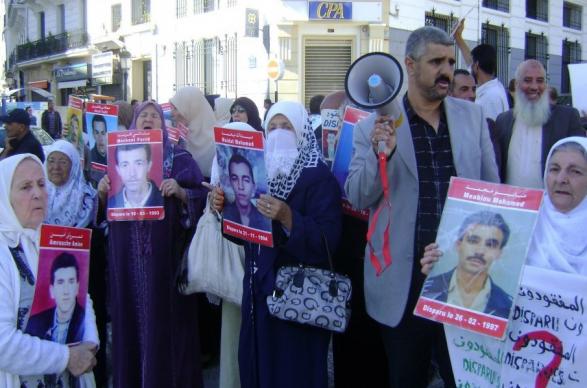
Collectif des familles de Disparus en Algérie: Human rights defenders in Algeria seeking ECOSOC status
Algerian NGO, Collectif des familles de Disparus en Algérie, struggles for UN consultative status to advocate for victims of enforced disappearances, facing procedural hurdles by the ECOSOC Committee on NGOs.
The Collectif des familles de Disparus en Algérie (CFDA) submitted its application for consultative status with the Committee on NGOs in June 2009. Since then, the Committee has deferred the application and CFDA has been asked 81 questions from the same group of States: Sudan, Pakistan and Venezuela. The Committee has posed questions to CFDA regarding the organisation’s activities, funds, financial beneficiaries and partnerships with other organisations.
CFDA was founded in Paris in 1999 by a group of Algerian mothers whose loved ones were victims of enforced disappearances during the Algerian conflict in the 1990s. The organisation’s main objective is to illuminate the fate of the victims of enforced disappearance and to end the impunity enjoyed by those responsible.
‘The CFDA considers that a genuine rule of law in Algeria can only be achieved through the right to truth and justice.’
Algerian civil society faces serious limitations because of restrictive legislation and policy on civil liberties. The law on associations severely restricts the freedom of association and the law on information gives the authorities the ability to control the media. Additionally, in Algiers, demonstrations are still prohibited, while in other parts of the country, prior authorization is required.
In addition to this restrictive legislation, human rights activists in Algeria often face judicial harassment and violent repression, as well as limitations on freedom of expression.
‘The CFDA keeps the memory of the victims alive and calls for their rehabilitation.’
Despite the obstacles the CFDA faces at the national level, the organisation seeks to establish networks with regional and international human rights organisations, such as the International Human Rights Federation (FIDH), the Euro-Mediterranean Human Rights Network or the Euro-Mediterranean Federation Against Enforced Disappearances.
Although the Committee has continuously deferred the CFDA, the organisation has still managed to engage with the United Nations. After collecting the testimonies of the families of victims, the CFDA lodges complaints with several international human rights mechanisms. The CFDA has filed over 4,000 cases to the UN Working Group on Enforced or Involuntary Disappearances (WGEID) and numerous individual communications at the UN Human Rights Committee.
In further efforts to shed light on human rights violations, the CFDA submitted an alternative report to the UN Human Rights Committee in 2007, to the UN Committee Against Torture in 2008 and during the Universal Periodic Review of Algeria to the UN Human Rights Council in both 2008 and 2012.
‘Lately, the NGO committee has presented the same questions all over again, questions that are unrelated to the eligibility requirements of Resolution 1996/31.’
The Committee has continually deferred the CFDA since 2009 by sending repetitive questions that are often unrelated to the eligibility requirements for consultative status established by Resolution 1996/31. Often, the questions posed give the impression that the Committee did not consult the information provided in the CFDA’s application. The Committee went as far as asking the CFDA why it had omitted to mention its website when it was clearly on the organisation’s initial application.
Recently, the questions posed by the Committee suggest that the CFDA’s contribution to ECOSOC would not be useful because of a lack of cooperation between the organisation and the Algerian authorities. However, these questions ignore the fact that the Economic and Social Council aims to consult non-governmental organisations, and cooperation with national authorities is not a requirement for consultative status.
‘The restrictions on the access to information in Algeria and the authority’s efforts to choke civil society reinforces the need to establish networks on international level and to ensure the sharing of information.’
Despite Committee members insisting that the CFDA gaining consultative status would not be useful to ECOSOC, the CFDA intends to continue its important work on promoting the human rights situation in Algeria, and more specifically, on exposing and obtaining justice for cases of enforced disappearances in Algeria. The CFDA collects information on violations of civil, political, economic, social and women’s rights of individuals in Algeria, which should be shared with member States and other NGOs. The ECOSOC consultative status is essential to the CFDA as it would allow the organisation to engage with all relevant organs of the United Nations, and have open, constructive dialogue with States and to reinforce relationships with other NGOs.
